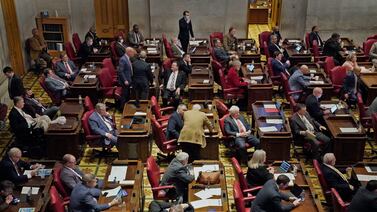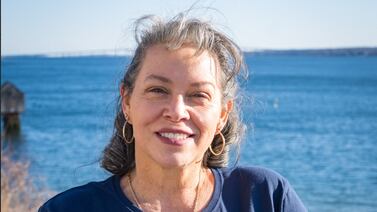Abram Sisneros was excited to go to kindergarten at the same school his older brother attended and where he had just completed two years of preschool.
But at a meeting before the start of kindergarten, his parents were told that Abram, who has Down syndrome, needed more services than the school could provide. He wouldn’t be able to attend the school his parents had chosen for him.
The district was able to turn Abram away because Colorado’s school choice law — which allows most students to attend any school that has room for them, regardless of boundaries — also allows school districts to reject students with disabilities if administrators say the school can’t meet a particular student’s educational needs.
A complaint filed with the U.S. Department of Education’s Office for Civil Rights alleges that state law allows school administrators to discriminate against students with disabilities and ignore federal civil rights requirements intended to protect them.
“The school choice law is not discriminatory on its face, but if you look at it in the context of special education and what families are being told and which families can’t enroll in a choice school, that’s when it becomes problematic,” said Emily Harvey, youth advocacy team leader for Disability Law Colorado and the lead author of the complaint.
Harvey said she hears frequently from families like the Sisneroses. In many cases, the rejected students have specialized education plans that call for a relatively low level of services and spend most of their time in general education classrooms, she said. State law doesn’t give families a lot of options because the discretion for administrators is so broad.
“It was really hard to have conversations with parents where a school district is citing school choice law to say why they’re being denied enrollment and feeling like if their kid has an IEP, school choice isn’t available to them,” Harvey said. “We don’t want parents to feel helpless.”
Individualized education programs, or IEPs, describe the educational needs and goals of students with disabilities and what services they need to be successful in school. Some students instead have 504 plans, if they qualify for extra help under a different section of federal law.
Rather than ask for separate investigations of individual cases, the complaint seeks changes to the school choice law on behalf of all Colorado students and names the State Board of Education, Education Commissioner Katy Anthes, and the Colorado Department of Education as the entities engaged in discrimination because they oversee the open enrollment system.
Dana Smith, a spokeswoman for the Colorado Department of Education said officials are aware of the complaint and the concerns raised by Disability Law Colorado, and the department is working to find a resolution.
Last year, Colorado changed the rules for when schools can ask about disability status and encouraged schools to accommodate students at their parents’ chosen option in response to an earlier Disability Law Colorado complaint.
The department doesn’t have authority over how districts run their open enrollment systems, Smith said, though it does look into complaints.
The Office for Civil Rights has not yet opened an investigation and has several months to decide whether to do so.
The complaint points to federal laws that require schools to show that accommodating a student would impose an undue burden or require fundamental changes to an educational program before turning a student away. That same standard should apply within the open enrollment system, Harvey said, rather than allowing administrators to assert that a school doesn’t have appropriate resources.
The school choice law also allows schools to reject students who have been expelled elsewhere. The complaint notes that students with disabilities are expelled at much higher rates than their peers, further limiting their ability to use school choice.
Advocates would like to see a more robust grievance process that lets parents appeal enrollment decisions and requires schools to be more specific about why they can’t serve a particular student. They also want schools to track which students are disenrolled after students are counted for purposes of calculating state funding.
Harvey said better funding for special education students would help a lot. Schools get extra money to serve these students, but it doesn’t cover the full cost.
Analysis of state data by recently graduated law student Rachel Hersch for Disability Law Colorado found wide variation among schools in the percentage of students with disabilities, even though most spend their days in general education classrooms.
In nearly all of 16 school districts surveyed by Disability Law Colorado, the five schools with the highest enrollment of students with IEPs were neighborhood schools and the five schools with the lowest enrollment were ones where all or most students use a choice process. These choice schools included both charter schools and district-run schools offering specialized programming in the arts, math and science, or project-based learning that make them appealing to families.
Abram’s parents, Anthony and Sarah Sisneros, had seen their older child thrive through the project-based, hands-on model at his school, and they thought it would be a great fit for Abram too.
The Sisneroses said they were shocked to be told Abram would need far more services than he had been receiving in preschool or than they thought he needed. The district told them their only option was to enroll Abram in a segregated program at their neighborhood school.
“Up until that point, school choice had been good for us, because our neighborhood school is one of the lower-performing schools in the district, and the school our older child attends is one of the highest performing,” Sarah Sisneros said.
“We feel really strongly that he doesn’t need to be in a segregated special needs classroom. We want him to be fully included with his peers, and all the research shows that children with Down syndrome who are in inclusive programs perform better academically.”
The family asked not to name the school or district because they are still hoping to reach a resolution and because they want to focus attention on the state law.
Abram is doing well in a general education classroom at a nearby Catholic school where Sarah Sisneros, a teacher, took a job so that she could tell her son they were “doing this together.” It took months to explain to Abram that he would not be attending school with his brother, as he’d looked forward to for so long, and Abram’s brother has a hard time understanding why his school doesn’t want Abram.
Children at the old school still ask where Abram is and why he doesn’t go there anymore.
One girl asked Sarah Sisneros if it was “because he looks weird or something.”
Sarah Sisneros said it’s heartbreaking that the school missed an opportunity to teach students about inclusion.
“That word disability floods people’s minds and nobody gives these students a chance,” she said. “Students should not have to earn their place at a school. Every student should be valued.”
Correction: This article has been updated to reflect that changes to rules about when schools ask about disability status applied to all schools, not just charter schools.
Bureau Chief Erica Meltzer covers education policy and politics and oversees Chalkbeat Colorado’s education coverage. Contact Erica at emeltzer@chalkbeat.org.








